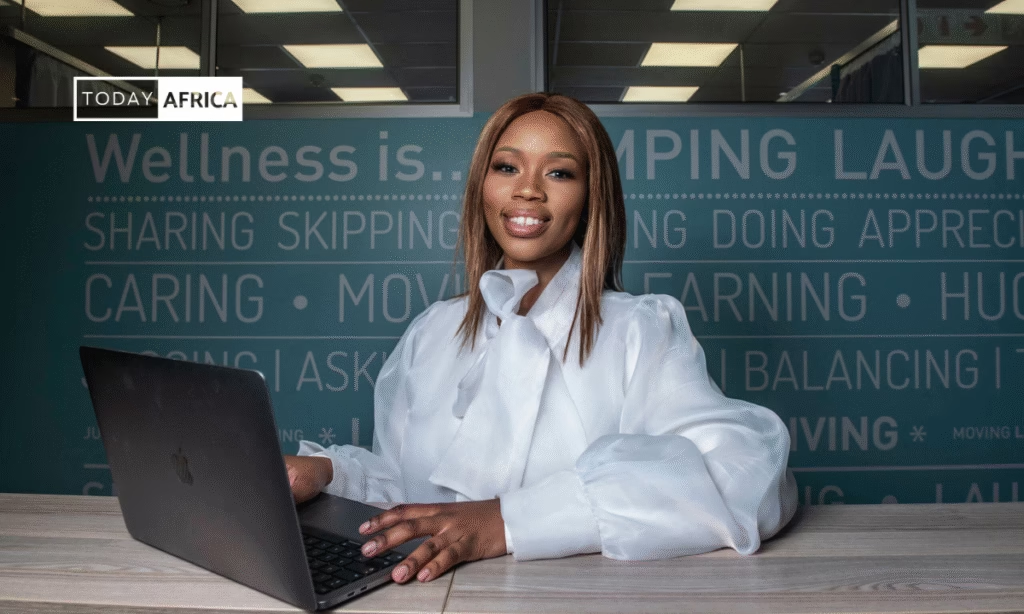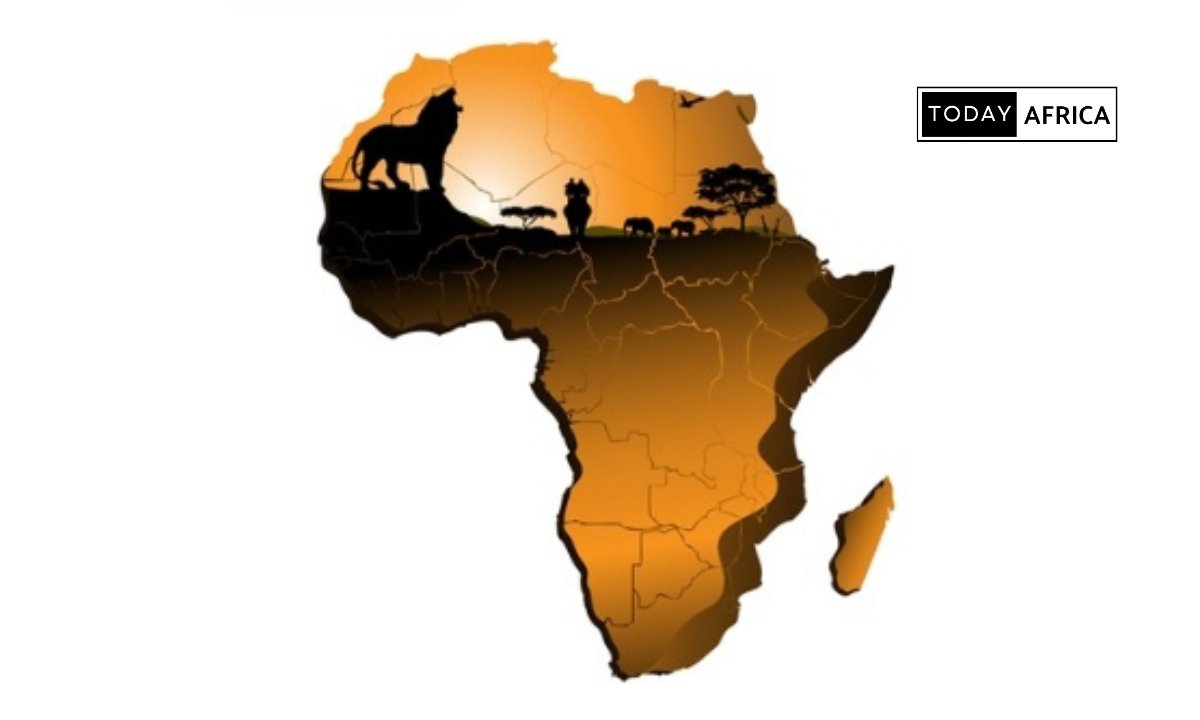We understand that in the world of entrepreneurship, where the road ahead is often uncertain and challenging, startup stories serve as guiding lights.
They remind us that even the most celebrated business personalities faced struggles, rejections, and setbacks before achieving greatness. These startup stories will inspire you to persevere, innovate, and take risks in your own entrepreneurial endeavors.
Startup stories of 16 African entrepreneurs we interviewed. Click here to read the previous editions.
Startup Stories of 16 African Entrepreneurs We Interviewed
1. Edgar Odey

- Industry: E-commerce
- Country: Nigeria
- Year founded: 2025
Edgar Odey is the founder of Darsh Market, an innovative platform aims to create a seamless and accessible marketplace for students and entrepreneurs looking to sell their products online.
He’s building Darsh Market alongside Yabatech Delivery, a brand committed to building & scaling local food delivery brands on college campuses.
Entrepreneurial lessons from the startup story of Edgar Odey
1. Launch fast, then iterate
Edgar emphasizes the importance of speed over perfection—“launch fast” is a mantra he’s carried from his Yabatech Delivery days into Darsh. Getting a minimum viable product in front of users early allows real feedback to guide development, isolating true market needs and refining the product accordingly.
2. Start with a real problem and evolve with the market
He built Darsh Market based on firsthand observations: seeing students unintentionally act as sellers through social media statuses. Identifying that pain point and addressing it directly—with an easy-to-use platform tailored to their behavior—is a textbook example of problem-driven entrepreneurship.
3. Monetize sustainably, but prioritize accessibility
Darsh is designed as a free marketplace—where buyers and sellers can interact freely—while the business plans to generate revenue later via paid ads and promotions. This model keeps user adoption friction low while promising long-term monetization. It’s flexible and scalable without compromising trust.
2. Kobusingye Mackline

- Industry: NGO
- Country: Uganda
- Year founded: 2021
Kobusingye Mackline, the Founder and Executive Director of VitalCare Connect, dedicated to improving maternal and infant healthcare for underserved pregnant women and infants in rural Uganda.
Through mobile clinics, she ensures essential healthcare reaches remote areas. Her outstanding work earned her recognition as a winner in the 2023 Savvy Fellowship Program.
With a Social Sciences degree and life coaching certification, Kobusingye Mackline’s expertise empowers underserved communities for healthier lives.
Entrepreneurial lessons from the startup story of Kobusingye Mackline
1. Start from a personal “why”
Her second childbirth exposed significant gaps in maternal care in rural Uganda. Instead of just observing, she turned personal pain into purpose, launching VitalCare Connect (also known as Mother Support Foundation) to directly address those challenges.
2. Build with scarce resources and community-first mindset
Kobusingye began by deploying mobile clinics to remote areas, stepping into communities that larger healthcare systems ignored . She didn’t wait for big infrastructure or investors. Start small, iterate fast, and deliver value directly where it’s most needed—even without fancy offices or significant capital.
3. Leverage recognition to scale impact
Her innovative work in maternal health won her the 2023 Savvy Fellowship and support from programs like Acumen and Women in Africa. Rather than vanity, she used these accolades to build credibility, attract partners, and grow reach. Awards and fellowships aren’t just trophies; they’re strategic assets you can use to forge alliances, raise awareness, and secure resources.
3. Mercy Obidake

- Industry: Media
- Country: Nigeria
- Year founded: 2019
Mercy Obidake is a Nigerian blogger, journalist, a PR strategist, and the CEO of MO Media, a company with the vision to inform, educate, entertain, and impact society.
She shared her inspiring journey of building a successful media company from scratch. From overcoming challenges to achieving milestones, Mercy opened up about her experiences, insights, and lessons learned along the way.
Entrepreneurial lessons from the startup story of Mercy Obidake
1. Start small, then scale deliberately
Mercy began MO Media with minimal resources—no fancy office, no big budget—but a strong belief in her idea. She focused on delivering quality content consistently, growing gradually by reinvesting earnings and building credibility one step at a time.
2. Turn early challenges into momentum
She openly discusses the obstacles she faced—market skepticism, resource limitations, industry competition. Rather than shrinking from these challenges, Mercy used them to sharpen her strategy, refine offerings, and prove the value of her media platform .
3. Be transparent, purposeful & community-centered
MO Media stands out not just for talking business but for honesty, relatability, and impact. Mercy’s open conversations—about setbacks, growth, purpose—resonate powerfully and build trust. Her mission to inform, educate, and entertain highlights that a strong brand needs a meaningful voice at its core .
4. Onkgopotse Khumalo

- Industry: Healthtech
- Country: South Africa
- Year founded: 2022
Onkgopotse Khumalo is a South African entrepreneur and the founder of Amari Health (formerly The Pocket Couch), a health tech startup that aims to democratize access to mental healthcare.
Her early professional journey saw her navigating financial services in the investment and portfolio management space, later transitioning to a management consultant role at McKinsey and Company.
She then ventured into entrepreneurship after identifying that what she had initially thought was a problem unique to her own circumstance, was in fact more widespread across the globe.
It was her journey trying to find avenues to better their mental well-being that catapulted her journey into entrepreneurship, ultimately founding the startup with which she has a strong personal nexus.
Entrepreneurial lessons from the startup story of Onkgopotse Khumalo
1. Start with genuine personal pain and build from there
Onkgopotse didn’t launch a mental-health platform merely to chase opportunity. She began because of her own struggle with accessing mental well-being resources, and a tragic friend’s death. That deep personal connection not only helped her understand the problem intimately but also fueled her unwavering passion to solve it.
2. Stay lean early, and fund smart
She largely self-funded her startup through saved salary, freelancing, and support from family/partners—while still freelancing on the side. She even advises: don’t quit your job until it’s untenable, and have at least four months’ runway.
3. Build a diverse support network and embrace adaptability
Onkgopotse highlights the critical role of community, mentorship, and allies, especially for women entrepreneurs. At Lionesses of Africa, she also emphasizes resilience: getting used to failure, learning quickly, and adapting—key traits for navigating startup uncertainty.
5. Oluwatobi Akinola
- Industry: Fintech
- Country: Nigeria
- Year founded: 2024

Oluwatobi Akinola is the co-founder of Monietab (formerly Stashwise), a gamified savings and investment app designed to make saving money fun and engaging for Africans.
He is also a creative product designer, passionate about building products that enhance everyday life for millions, with years of experience creating impactful and user-centric digital solutions.
Entrepreneurial lessons from the startup story of Oluwatobi Akinola
1. Solve a real, relatable problem
Oluwatobi identified a genuine challenge—many young Nigerians find saving and investing complex, boring, or intimidating. By addressing this pain point head-on, he shaped Monietab into a solution that truly resonates with users rather than creating a product in search of a market.
2. Blend education with engagement
Monietab isn’t just an app—it transforms saving into an interactive experience. By incorporating financial lessons, goals, badges, and a rewards system (Stashcoins), the platform motivates users intrinsically and extrinsically.
3. Leverage your unique background and expertise
Oluwatobi draws on his interdisciplinary skills—design, strategic thinking, business, and user-centric focus—to build Monietab. This combination has shaped both the user experience and the platform’s mission.
6. Habeeb Lawal
- Industry: Oil & Gas
- Country: Nigeria
- Year founded: 2024

Habeeb Lawal is a creative problem solver and entrepreneur with a sharp eye for opportunities where others see challenges. Driven by a passion for innovation, Habeeb co-founded Gasfeel — a tech-enabled fuel delivery platform that makes ordering petrol and cooking gas very simple.
His journey into entrepreneurship began long before Gasfeel, fueled by a deep desire to build solutions that matter. With a mindset focused on identifying problems, creating solutions, and monetizing them, Habeeb is committed to making everyday services more accessible and efficient for Nigerians.
Entrepreneurial lessons from the startup story of Hebeeb Lawal
1. Start with a simple, relatable idea
Habeeb noticed how easy it was to order everyday essentials like food online and realized petrol and cooking gas could follow the same model. That casual “example for my friends” quickly evolved into the foundation of a viable business idea. Don’t dismiss small, everyday problems—they often hold the seeds of scalable businesses.
2. Validate with market research
Once the idea struck, Habeeb didn’t proceed blindly. He researched the fuel industry, discovered its multi-billion-dollar potential, and used that insight to build confidence in the concept of Gasfeel. Before investing time and resources, analyze the market to confirm demand and scale.
3. Act on your idea immediately
Habeeb didn’t wait for perfect timing or conditions—he immediately began implementing the platform as soon as the concept felt right.
7. Faith Ariremako (The Hair Queen)
- Industry: Skincare
- Country: Nigeria
- Year founded: 2023

Faith Ariremako (The Hair Queen), founder of Royalpriss Hair Hub, is driven by a passion for empowering individuals through their hair and building meaningful relationships with her clients.
Her journey with Royalpriss began with the desire to create a space where people could feel confident and cared for, both in terms of their hair health and overall well-being.
Entrepreneurial lessons from the startup story of Faith Ariremako
1. Patience & consistency over hype
Faith emphasizes that businesses don’t “blow up” overnight. She notes the necessity of patience through ups and downs—“there are days you sell well, there are days when things are bad”—and highlights consistency: staying visible and engaged keeps your brand top of mind.
2. Build structure around passion
While passion ignited her business, Faith stresses that passion alone isn’t enough. “Passion is great but structure sustains every business.” She learned the hard way that systems for marketing, financial tracking, and pricing are crucial.
3. Deliver personalized customer experience
Faith’s approach to customers is highly personalized: she runs one-on-one consultations, tests hair types before recommending products, and includes tailored packaging and usage guides.
8. Funmilayo Esther Famuyiwa
- Industry: Agriculture
- Country: Nigeria
- Year founded: 2019

Funmilayo Esther Famuyiwa is a social entrepreneur, climate change advocate, and data analyst passionate about leveraging technology for innovation, sustainability, and food security in agriculture.
As an advocate for female cassava farmers, she is committed to enhancing food production, reducing carbon footprints, and driving economic growth through sustainable agribusiness practices.
She is the co-founder and CEO of Ayosifam Integrated Service Ltd, a company that processes and packages gluten-free food products, including cassava flour, fufu flour, potato flour, rice flour, garri, lebu, and CASMA flour.
Entrepreneurial lessons from the startup story of Funmilayo Esther Famuyiwa
1. Use what you have as leverage
Funmilayo chose to use her NYSC certificate as collateral to secure a ₦2 million non-interest loan from the Bank of Industry. Instead of waiting for a job, she leveraged a credential she already possessed to jump-start her agribusiness. Don’t wait for perfect conditions, deploy existing assets (credentials, networks, knowledge) to fund your business and take action.
2. Segment your market, premium isn’t for everyone
Initially, her clean, sand-free garri was priced above the usual Ilorin standard, and sales were sluggish. She learned that not every segment is your customer. After attending entrepreneurship training, she focused on targeting premium buyers, secured NAFDAC certification, and repositioned her product for those who valued quality.
3. Embrace mentorship and “failing forward”
Funmilayo emphasizes “fail fast and fall forward.” She encourages paying for access to mentors and learning early on from those who have been there, because buying experience is cheaper than paying for your own mistakes. She also notes that every challenge is a lesson, and solving one simply prepares you for the next.
9. Márcia Dima
- Industry: Agriculture
- Country: Mozambique
- Year founded: 2022

Márcia Dima is founder of N’toko Organic Lda, a startup dedicated to adding value to solid waste through the production of biofertilizers and organic compost.
Through N’toko, she is promoting sustainable agricultural practices and advancing the circular economy in Mozambique, transforming waste into value and fostering environmental awareness at the community level.
Entrepreneurial lessons from the startup story of Márcia Dima
1. Follow intuition — and learn fast
The name “N’toko” simply “popped into [her] mind” during a TotalEnergies challenge entry, even before she had a full technical grasp of composting. Yet once she committed, she dove into learning how biofertilizers worked, turning a spontaneous idea into a purposeful venture.
2. Use proof-of-concept to win trust
Organic methods were novel—and pricier—than chemical alternatives in Mozambique. Márcia faced skepticism from farmers worried about cost and results. Her strategy? Offer small-scale trials and ongoing technical support so users could “see the results” and then become advocates themselves.
3. Build resilience by adapting and partnering
N’toko paused operations due to election-related unrest and lacked funding for mechanization. Instead of quitting, Márcia tapped into partnerships, scaled gradually (starting with home compost bins in Maputo), and realigned her model to meet market realities.
10. Solomon Ssekamanya
- Industry: Agriculture
- Country: Uganda
- Year founded: 2021

Solomon Ssekamanya is a Ugandan social entrepreneur, business mentor, and co-founder of EverGrow Organics, a social enterprise revolutionizing Uganda’s agricultural sector through organic and agroecological farming practices.
With a background in international relations and diplomacy, Solomon pivoted to agriculture after witnessing firsthand how climate change and synthetic fertilizers devastated his family’s farm and income.
Today, he is committed to empowering smallholder farmers with sustainable solutions, such as EM Super organic fertilizer and Farm Power animal supplements.
Entrepreneurial lessons from the startup story of Solomon Ssekamanya
1. Patience is a strategic asset
Solomon emphasizes that impactful ventures don’t bloom overnight. Building endurance and staying the course are essential: “Patience is very key. Things just don’t come overnight… fight very hard to see that you create an everlasting impact for tomorrow.”
2. Assemble the right team—not just any team
A shared vision and aligned passion among co-founders are non-negotiable: “If you don’t have the right business partners… you will fail.” Solomon also credits his co‑founder, Suzan, for their partnership’s strength: working with someone whose drive, background, and values align ensures mutual commitment.
3. Cultivate diverse forms of capital, especially social
Beyond financial resources, intellectual, experiential, and relational capital drives growth. Solomon highlights:
- Bootstrapping using community knowledge and farmer networks
- Leveraging grants
- Relying on a strong support system of mentors and advocates: “You need to have a network of people that believe in you… opportunities come in… because of recommendations.”
11. Njemo Naomi
- Industry: Edtech
- Country: Cameroon
- Year founded: 2019

Njemo Naomi is a Cameroonian social entrepreneur, communication strategist, and passionate youth advocate who has spent over six years nurturing young leaders across Africa.
In 2019, Naomi founded Youthkonnect, a pioneering edtech initiative born out of the sociopolitical crisis that disrupted education and displaced thousands of young people in Cameroon.
Witnessing the despair around her, Naomi had a powerful realization: if youth couldn’t reach the classroom, maybe education and eempowerment could reach them instead.
Entrepreneurial lessons from the startup story of Njemo Naomi
1. Turn crisis into opportunity
When the Anglophone conflict and the COVID‑19 pandemic shut down formal schools, Naomi didn’t wait; she founded Youthkonnect in 2019 to bring education to where youth were, not to the classroom. Real problems often hold real opportunities—innovative solutions emerge when you seize the moment.
2. Build through partnerships & community
She partnered with local groups—including the Ninitemban Foundation—and mobilized over 300 volunteers and 50 organizations to host a National Volunteers Conference and run flagship programs such as YouthLevel Up and Next Elites. Collaborative networks and grassroots support amplify impact more than solo efforts ever could.
3. Focus on transformational, purpose‑driven impact
Youthkonnect’s mission centers on transformational education, teaching global citizenship and sustainable leadership, not just academic subjects. By 2025, it aims to reach 3,000 youth, underscoring commitment over hype. A mission rooted in real change—or purpose—fuels persistence and attracts loyal participants and supporters.
12. Buyiswa Twala
- Industry: Agritech
- Country: South Africa
- Year founded: 2021

Buyiswa Twala is a South African entrepreneur and the founder of Agrigreat Soiltech and Envirocare, an award-winning company that converts biowaste from townships into organic compost and fertilizers.
With a background that includes construction and a passion for solving real-world problems, she is working to address soil degradation and food insecurity issues in South Africa and Africa.
Through her company, she aims to promote sustainable farming practices while creating affordable, effective solutions for smallholder farmers and home growers.
Entrepreneurial lessons from the startup story of Buyiswa Twala
1. Innovate locally with circular solutions
Buyiswa transformed township bio-waste into organic compost and fertilizers, tackling soil degradation and food insecurity head-on while creating sustainable, context-specific products for smallholder and home farmers. Build businesses that use locally sourced inputs to address local challenges—innovations rooted in your community can drive lasting impact.
2. Multi-sector experience builds resilience
Before founding Agrigreat, Buyiswa worked in construction and discovered her passion for problem-solving through practical, hands-on roles. Diverse professional experiences strengthen entrepreneurial resilience; they help you identify real-world challenges and build the skillset to address them effectively.
3. Purpose-driven growth enhances sustainability
Agrigreat Soiltech and Envirocare isn’t just a business—it’s a mission to promote sustainable farming practices and tackle environmental issues across South Africa. Anchoring your venture in social and environmental purpose builds deeper meaning and long-term growth, turning profits and positive change into intertwined goals.
13. Christopher O. Fallah
- Industry: Digital platform (fintech, e-commerce, AI, marketing, etc.)
- Country: Liberia
- Year founded: 2021

Christopher O. Fallah is the CEO and Founder of Annita, Africa’s first unified digital platform, combining e-commerce, fintech, artificial intelligence, logistics, communication, marketing, and lifestyle services into one integrated ecosystem.
This platform is designed to address the diverse needs of businesses and consumers, creating a seamless experience that drives economic empowerment, improves access to services, and fosters job creation across the continent.
Entrepreneurial lessons from the startup story of Christopher O. Fallah
1. Build for the underserved “80%,” not just the urban elite
Fallah recognized that most fintech and e-commerce solutions ignore rural and unbanked populations. By focusing on those overlooked—market women with basic phones—he created services that truly meet their needs.
2. Start where you are and stay purposeful
Rather than delaying until everything was perfect, Fallah began with small affiliate marketing efforts and slowly expanded. His drive is rooted in a clear purpose—not just profit. He emphasizes: “Never stop dreaming big… Start where you are,” a mindset that guided Annita’s three-year evolution.
3. Educate your users and involve local communities
Understanding that many users lacked digital literacy, Fallah organized vendor training, offered support via calls and texts, and leveraged young people to help elders adapt. This community-driven onboarding was key to Annita’s grassroots success.
14. Fana Haregot
- Industry: Manufacturing
- Country: Ethiopia
- Year founded: 2019

Fana Haregot, a chemical engineer, marketing professional, and entrepreneur, grew up in the small town of Kwiha in Ethiopia’s Tigray region.
From her childhood struggles, she built a mission-driven enterprise that now empowers underserved communities through affordable, eco-friendly hygiene products.
Today, as the founder and CEO of Fana Hygiene Solutions, she leads a growing social enterprise that produces affordable, eco-friendly hygiene products designed to serve underserved communities.
Entrepreneurial lessons from the startup story of Fana Haregot
1. Turn hardship into purpose‑driven opportunity
Fana’s own experience – growing up in a low-income household with limited access to hygiene products and watching her twin brother suffer from preventable illness – became the launching point for her venture. Rather than chasing conventional comfort, she converted scarcity and personal pain into a socially impactful business: eco‑friendly, affordable hygiene essentials for underserved communities.
2. Build resilience through values and vision
Raised by a single mother who emphasized education and perseverance, Fana internalized resilience and responsibility from an early age. These values not only shaped her character but also became the foundation of her company’s identity. Her conviction – “I’m not just building a business, I’m building hope, dignity, and opportunity”—drives both her strategic and social impact decisions.
3. Align expertise with market needs
With degrees in chemical engineering and marketing, plus ongoing studies in impact entrepreneurship, Fana leveraged her multi‑disciplinary background to develop quality hygiene products tailored to her community’s needs. Her scientific training ensured product integrity, while her marketing skills enabled grassroots positioning and credible outreach.
15. Ayoola Ogunyomi
- Industry: Startup marketplace
- Country: Nigeria
- Year founded: 2022

Known for his curiosity and drive, Ayoola Ogunyomi has actively pivoted into emerging technologies, including cryptocurrency, blockchain, AI, data science, and design thinking.
He is the co-founder and CEO of Umbrella, a platform designed to bridge the investment-exit gap in Africa’s startup ecosystem by connecting vetted startups, investors, and advisors under one trusted structure.
Entrepreneurial lessons from the startup story of Ayoola Ogunyomi
1. Embrace multidisciplinary curiosity to uncover gaps
Ayoola’s transition from marketing into fields like blockchain, crypto, AI, and design thinking equipped him with a diverse toolkit – brand-building, consumer insight, and storytelling. This range allowed him to identify and understand the systemic issues in Africa’s startup ecosystem, ultimately shaping the solution that became Umbrella.
2. Build infrastructure, not just products
Through speaking with founders and investors across Africa, Ayoola realized the problem wasn’t innovation—it was the lack of reliable infrastructure for raising, investing, and exiting. Instead of creating another app, he built “Umbrella” as a full ecosystem: vetting tools, capital access, advisory, and exit mechanisms.
3. Normalize failure and celebrations in equal measure
Ayoola stresses that failure isn’t shameful—it’s a learning opportunity. He noted African founders often hide exits due to stigma, while Western founders celebrate and reinvest. Umbrella’s mission includes de-stigmatizing exits and fostering openness about failure and pivoting.
16. Peter Browne
- Industry: Agritech
- Country: South Africa
- Year founded: 2017

In a world where poverty, food insecurity, and inequality continue to shape the lives of millions, Peter Browne is using faith and tech to empower emerging agripreneurs in South Africa.
A South African mathematician-turned-entrepreneur, Peter walked away from successful businesses to pursue a bold vision: using digital innovation to uplift emerging farmers and combat poverty at scale.
As the Founder and CEO of Farming By Faith, a digital platform that equips African farmers with tools to improve productivity, access markets, and become profitable, Peter is rewriting the script for agriculture on the continent.
His journey – from running a fish farm that empowered recovering drug addicts to exploring blockchain-powered currencies for farmers – is a testimony to purpose-driven innovation.
Entrepreneurial lessons from the startup story of Peter Browne
1. Scale through digital platforms—not fixed assets
By shifting his focus from capital-intensive farming (e.g., fish farms, vehicles, and infrastructure) to a digital-first model, Peter learned that true impact, especially in tackling poverty, comes from scalable solutions. Investing in code and lean tech enables helping many people rather than being tied down by one physical project.
2. Embrace resilience and guard capital
Having faced significant financial setbacks (even bankruptcy), Peter underscores two core principles: “don’t lose money” and “don’t give up.” Surviving adversity and respecting the sanctity of capital have been the foundation of his entrepreneurial grit.
3. Build with purpose and partnerships
His approach to Farming By Faith is deeply purpose-driven, rooted in faith and biblical principles, and strategically lean, involving collaborative partnerships for training and support. He positions himself not as the provider of all answers, but as a connector: generating leads and facilitating access to education, capital, and markets.
Leave a comment below and follow us on social media for update:
- Facebook: Today Africa
- Instagram: Today Africa
- Twitter: Today Africa
- LinkedIn: Today Africa
- YouTube: Today Africa Studio
















